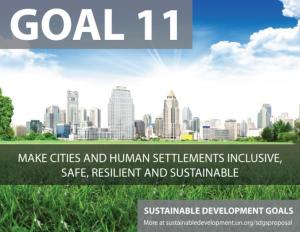 Last week in New York, the world’s leaders signed a commitment to achieve a new set of sustainable development goals by 2030. Reflecting growing recognition of the importance of cities for human development, sustainable development goal 11 specifically addresses improving cities and human settlements to make them “inclusive, safe, resilient and sustainable”. The seven specific targets for this goal can be read here but note that it includes affordable housing and slum upgrading and “access to safe, affordable, accessible and sustainable transport systems for all, improving road safety, notably by expanding public transport, with special attention to the needs of those in vulnerable situations, women, children, persons with disabilities and older persons”- key areas for improvement in Nairobi- along with other critical target areas. A number of African cities, including Joburg and Maputo, have explicitly signed on to supporting these goals and also using them as part of their strategic planning. Will Nairobi join them?
Last week in New York, the world’s leaders signed a commitment to achieve a new set of sustainable development goals by 2030. Reflecting growing recognition of the importance of cities for human development, sustainable development goal 11 specifically addresses improving cities and human settlements to make them “inclusive, safe, resilient and sustainable”. The seven specific targets for this goal can be read here but note that it includes affordable housing and slum upgrading and “access to safe, affordable, accessible and sustainable transport systems for all, improving road safety, notably by expanding public transport, with special attention to the needs of those in vulnerable situations, women, children, persons with disabilities and older persons”- key areas for improvement in Nairobi- along with other critical target areas. A number of African cities, including Joburg and Maputo, have explicitly signed on to supporting these goals and also using them as part of their strategic planning. Will Nairobi join them?
For Nairobi to contribute to achieving these goals, it will need to improve its governance performance. Recently, the Auditor General’s report for Nairobi County Executive and Assembly for the year 2013-2014 was released. It makes for sober but familiar reading, detailing no doubt deliberate financial disorganisation, the usual appalling land grabbing and the failure to collect rates that could be put into better service delivery if the financial system had more integrity (read the reports here). Using the new sustainable development goals and targets, Nairobi residents might assess where they want to go and after reading the AG report demand what specifically needs to change in county gover
nance to ensure that it happens. Nairobi, with all is remarkable assets, should gear up to meeting the new urban sustainable development goal targets-but, as the AG report makes clear, this will take some changes.

